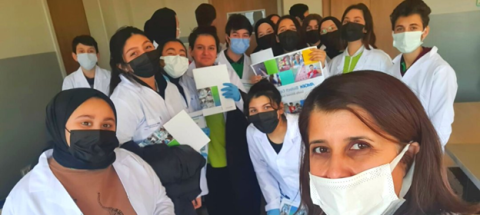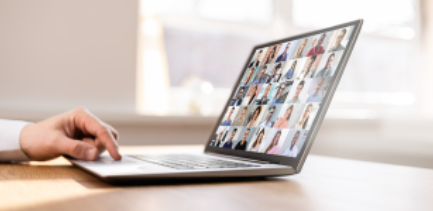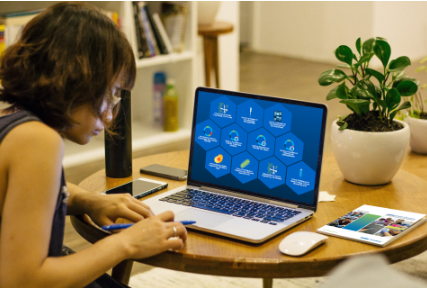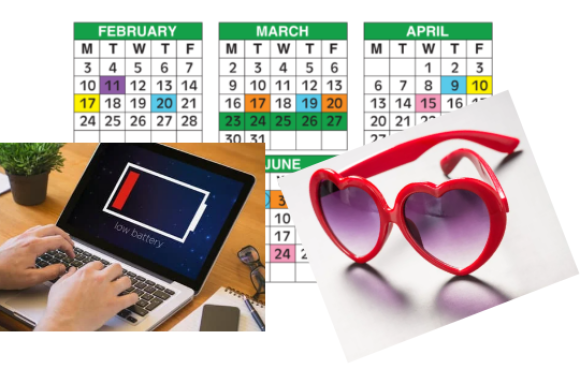Masks, sanitizer, a special ring, signature sunglasses, family photos, a laptop charger—these were some of the items that students listed they would include in a time capsule to open 50 years from now to help reflect their time during the pandemic. From the practical to the sentimental, these items represent just a sliver of the experiences of the half dozen ABE students from around the world we talked with about their time learning during COVID-19.
For Beatrice Saviano Naples, an ABE Italy student, she would want the objects in the time capsule to help us “remember the difficult time that the pandemic has represented for humanity.” But she would also want it to be symbolic of how science has helped save lives, with her capsule including a dose of the COVID-19 vaccine.
The pandemic has perhaps represented the largest disruption and shift to the educational system in modern times, affecting students around the world. Their shared, yet distinct, experiences point not only to the resilience of global youth but also to the power of science to connect.

“The pandemic has completely changed our way to learn and acquire skills,” Saviano Naples says. “Before, everything was in-person, interactive, and captivating, and then, suddenly, we found ourselves thrown into a new alienating existence made by computer and machine, faces on a screen. Suddenly we had to stay behind a computer, learning concepts passively and following lessons by online video conferences. That was definitely a difficult time for all of us young people to overcome.”

For many, it has been a roller coaster of emotions. “The transition to virtual learning during the pandemic and then back to in-person has been, in one word, crazy,” says a 12th-grade ABE Greater Los Angeles Area (ABE-LA) student from Porterville High School. “As silly as it may sound, I remember crying when my mom shared the news that we wouldn’t be returning back to school my junior year.”
For İlayda Nur Canyurt, an ABE Türkiye student, the transition from distance education to online and then back again highlighted the importance of face-to-face education. “We cannot talk with our friends in online education,” she said. “And it was more difficult to adapt to the courses at home.”
But while the experience was “frightening, lonely, and boring,” the 12th-grade Porterville student said they learned that “new didn’t have to mean bad, and that perspective was as powerful.”
Indeed, many ABE students have described the social and emotional learning that took place during the pandemic, including everything from learning to read eyes instead of facial expressions and growing an appreciation of the friendships they had. The pandemic also presented a new opportunity for both students and teachers to adapt laboratory experiences in new ways.
“The Amgen Biotech Experience came to our rescue, transporting the laboratory experience to the computer and making classes less boring and more engaging,” Saviano Naples says. Her teacher, Silvia Maria Lippo, was able to use the LabXchange platform to complete interactive online labs, including micropipetting and electrophoresis. “These labs have certainly helped us in understanding all the theoretical notions that we had learned in online classes, demonstrating, even if always on computer, the concrete, practical application of our studies,” she explains. “Returning then back in person, we were able to reproduce the experiment hassle-free and without a guide.”

For ABE Rhode Island student Yessenia Carabello, the return to in-person learning for her senior year this year in AP Biology has meant a return to the hands-on science she enjoyed. “Doing ABE labs is so much more fun than just reading something,” she says. “It’s great to physically see and touch something in doing the experiments.”
The ABE labs have sparked an interest in science for ABE Türkiye student Tuğba Gizem Şimşek, who previously was not interested in the subject: “Making observations in the lab with my friends and my teacher was very exciting. We wore laboratory coats and took pictures.”
“Participating in the ABE program was so good and fun during the pandemic,” Nur Canyurt says. “It changed my perspective on genetic engineering and toward applied knowledge and thought.”
The ABE labs have also brought biotechnology into crucial focus during a time in the world where science has been vital. “The ABE labs made me realize and focus on real-world problems that are currently occurring,” says a 10th-grade ABE-LA student, also at Porterville.
Returning to the time capsule, here is one snapshot from the ABE-LA 12th grader at Porterville: “If I were to make a time capsule of the pandemic for a high school student to open in 50 years, I would include my red heart-shaped sunglasses, a school calendar of the year 2020, and a Chromebook charger. My red shaped sunglasses would hold sentimental value not only to myself but to the time of reflection. For the moments I would go outside and enjoy some sun, just to put the world on pause while in a time so crazy. The school calendar would mean all the days we missed being in school, on campus. Not seeing friends, teachers, counselors, etc., in real time, feeling like a fever dream. And finally, the Chromebook charger would simply show the hours we spent online, never fully charged. Just like most people were never quite sure of the moment we’re enduring.”
